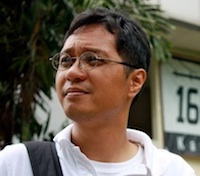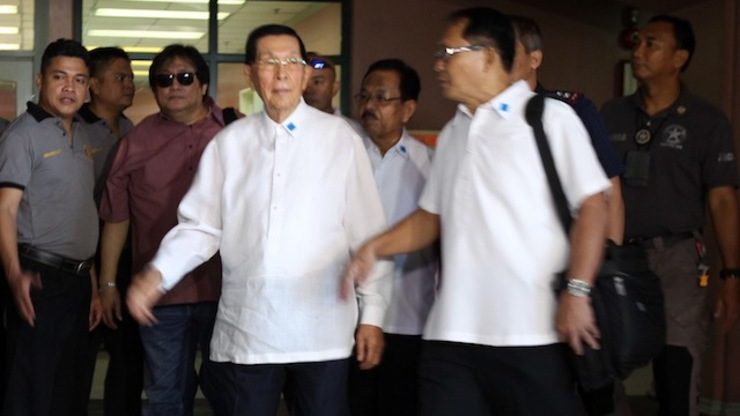SUMMARY
This is AI generated summarization, which may have errors. For context, always refer to the full article.
 Juan Ponce Enrile is probably the most hated senior citizen in the Philippines today.
Juan Ponce Enrile is probably the most hated senior citizen in the Philippines today.
Since his name was implicated in the P10-billion (US$229.7 million)* pork barrel scam, the detained senator has lost whatever goodwill he might have gained during the impeachment trial of former chief justice Renato Corona. While wanting to leave a positive legacy “at the sunset of my years” (as he poetically puts it in his autobiography), Enrile instead got himself into another political controversy from which he may never recover.
But the Devil, as the old saying goes, must be given his due. For unlike Senators Jinggoy Estrada and Bong Revilla who had earlier been placed under police custody, Enrile, on the other hand, was able to enjoy two additional weeks of freedom before his arrest was finally ordered by the Sandiganbayan.
For their part, Enrile’s family and friends are not sitting idly by, and are exhausting all available means to bring their principal out of Camp Crame.
In fact, even before the anti-graft court could order his detention, Enrile’s lawyer Joseph Sagandoy Jr was already insisting that his client instead be placed under house or hospital arrest. Citing Enrile’s fragile health predicament, Sagandoy said that the 90-year-old senator is suffering from diabetes mellitus and hypertension, and would require “a medical attendant or companion practically 24 hours a day.” He further added that Enrile has an eye condition which, if left unchecked, can lead to permanent blindness.
Unlikely support
Surprisingly, Enrile found unlikely support from Senators Antonio Trillanes IV and Bongbong Marcos, who both emphasized his advanced age and medical condition. Bongbong is, of course, the son of former dictator Ferdinand Marcos who fell from power when Enrile’s botched military uprising turned into the first People Power Revolution.
But the younger Marcos showed no hint of bitterness when he told reporters on June 26 that “Senator Juan Ponce Enrile is in need of constant medical attention.”
Speaking in a mix of English and Filipino at the weekly Kapihan sa Senado, Bongbong added, “Ang ugali naman ng Pilipino (The Philippine way) is always to show compassion. Maybe this is another opportunity for us to express our culture in that way.”
Trillanes had once accused then-Senate President Enrile of railroading the division of Camarines Sur, resulting in a bitter word war between the two. But in an interview on June 25, the former rebel soldier said that he is in favor of placing his estranged colleague under hospital arrest, arguing that “senior citizens would have special needs.”
Presidential attention
As expected, the issue also caught the attention of President Benigno “Noynoy“ Aquino III, who expressed willingness to grant greater leniency and consideration to the embattled senator.
Citing Section 19, Subsection 1 of the Bill of Rights, the Chief Executive told reporters that the government is not supposed to impose cruel, degrading or inhumane punishment, especially if the person involved is an ailing nonagenarian like Enrile. Aquino was even quoted as saying: “The senator is 90 years old – the guy is known to have a lot of ailments….Parang dapat may consideration naman ‘yun (it should be given some consideration).”
From his remarks, I would surmise that the President has two seemingly innocuous premises in mind: first, that Enrile deserves fair and humane treatment. And second, that by doing so, no special privilege is given to the former Senate president and is, instead, actually regarded like any other common Filipino.

Challenging the premises
Of course, these two propositions should be beyond dispute. Regardless of our opinion about him as a politician, Enrile should be treated fairly by the authorities, not because he is a senator, but because he is a human being and a citizen of the Republic.
Fairness, however, is not a codified set of provisions that is to be applied regardless of social context. Rather, it is a broad operative principle that has to be interpreted in light of the gross inequality prevailing in our country. And as we acknowledge this uneven distribution of power and resources, the more we are compelled to provide preferential option for the poor, the weak and the marginalized.
Enrile, however, cannot be placed under such categories, for he is a veteran politico with wealth, power, and influence at his disposal. In fact, based on his 2013 SALN alone, Enrile is considered one of the most affluent members of the Senate with a net worth of P119.377 million ($2.74 million)*. This is far beyond the reach of the common Filipino, whose average family income is a modest P19,600 ($450) a month.
With such vast resources, Enrile can easily thwart the cause of justice and keep himself from landing in jail. The state, therefore, should take a more pro-active approach in this case to balance and counteract whatever advantages Enrile may have. It should also be kept in mind that the state, as the collective will of the people, must ensure fairness at all times. This means that if the accused is a person of means, then the state should intervene on behalf of the disadvantaged public.
Simply put, Enrile and those like him should indeed be treated “differently” by authorities. For as Madeleine L’Engle gently reminds us in her children’s book, A Wrinkle in Time, “like and equal are two entirely different things.”
Principle of accountability
We should also remember that in a democracy, power and accountability are two sides of the same coin. This principle is based on the notion of the “social contract” which is agreed upon by both the government and its people.
Under this arrangement, the people surrender a portion of their power to the government, so that the latter can perform functions that advance the good of all. To prevent any possible abuse, certain constraints are placed on how government exercises power.
In addition, public officials also have corresponding degrees of accountability based on the degree of power and authority that are given to them. The more power that one has, the greater is his or her responsibility.
Since our leaders are elected to exercise power, they should then be made accountable for how they use the power granted to them. By doing so, public officials are subjected to a higher set of standards, which sanctions even the slightest infraction.
It is for this reason why Enrile’s case is extremely important. With his power and influence, Enrile is believed to have committed plunder by pocketing P172 million ($3.95 million) in kickbacks from alleged PDAF scam mastermind Janet Lim-Napoles.
If Enrile is indeed guilty of plunder, then it comes with a corresponding accountability – imprisonment. If Enrile cannot be made to account for his actions as a public official, then he has no business assuming such power. If we cannot put him in jail because of his age, then he shouldn’t be in the Senate in the first place.
And that is precisely the fault in our system. For we often treat erring leaders with kid gloves, forgetting that power and accountability are supposed to go hand-in-hand. As a consequence, the powerful are treated “equally” like all the rest, when in fact, they are not the same as everybody else.
Ironically, even Enrile is painfully aware of this malady of ours. In his memoir, he laments our failure to develop as a nation which he attributes to the “lack of a strong will to resist the temptations and corruptive influences of power, money and privilege.” He also decries how “the selfish ambition and avarice of some have incessantly obstructed the road to meaningful change and reform.”
I fully agree with his observation. Unfortunately, it seems that Enrile has yet to get out of his hospital bed and take a long hard look in the mirror. – Rappler.com
Francis Isaac is a researcher at the Jesse M. Robredo Institute of Governance of De La Salle University (DLSU).
*$1 = P43.53
iSpeak is Rappler’s platform for sharing ideas, sparking discussions, and taking action! Share your iSpeak articles with us: move.ph@rappler.com.
Tell us what you think about this iSpeak article in the comments section below.
Add a comment
How does this make you feel?





There are no comments yet. Add your comment to start the conversation.